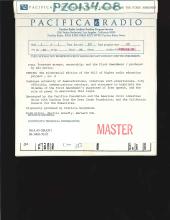This is the 8th in a series of 13 episodes. This program combines actuality of demonstrations, interviews with entertainers, city officials, communications scholars, and attorneys to highlight the dilemma of the First Amendment's guarantee of free speech and the role of power in exercising that right. Sponsored by the Pacifica Foundation and the American Civil Liberties Union Foundation with funding from the Deer Creek Foundation, St. Louis, Missouri; and the California Council for the Humanities, a state program of the National Endowment for the Humanities. Bicentennial Edition researched, edited, and produced by Adi Gevins, 1987; engineered by David Rapkin; announcer, Brenda Wilson; original program produced by Patricia Neighmond.
KPFA folio notes: ABC's mini-series Amerika and The Day After spark criticism of bias in news and entertainment programming. The Parents' Resource Committee attempts to place warning labels on rock and roll albums they say contain satanic messages or promote amoral behavior. The Meese Commission Report contains sections on obscenity that encourage public pressure to influence media specifically. All of these conflicting interests--the rights of artists to express, of the audience to experience and of pressure groups to protest--are protected by the First Amendment. This program combines recorded demonstrations, interviews with entertainers, city officials, communications scholars, film soundtracks and music. It leaves the audience to consider the dilemma of First Amendment protection of free speech and the freedom to express. Participants and consultants include Todd Gitlin, Phyllis Schlafly and Bernard Yoh of Accuracy in Media.


